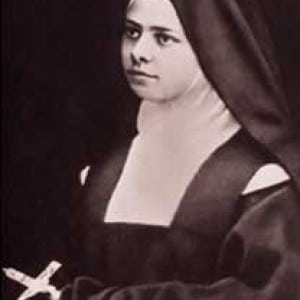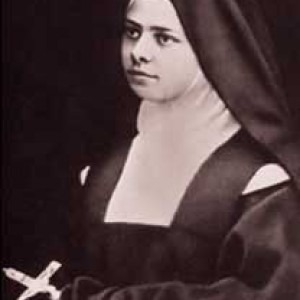Podcast: Play in new window | Download (Duration: 26:30 — 18.3MB) | Embed
Subscribe: Apple Podcasts | Spotify | Amazon Music | Android | Pandora | iHeartRadio | JioSaavn | Podchaser | Gaana | Podcast Index | Email | TuneIn | Deezer | Anghami | RSS | More

Episode 10 – “Heaven in Faith” Day 5 Prayer 2 – “He who eats My flesh and drinks My blood, remains in Me and I in him.”
In this episode, Dr. Anthony Lilles and Kris McGregor discuss the profound eucharistic themes in Elizabeth’s reflections, emphasizing the transformative power of receiving Jesus in the Eucharist. Elizabeth portrays this communion as an intimate exchange where Christ’s love and generosity invite us to surrender fully, allowing Him to purify and consume our beings with His grace and presence.
Dr. Lilles highlights the significance of preparing oneself for receiving Holy Communion, engaging deeply with the liturgy, and being open to the transformative encounter with Christ’s presence. He also connects this to the broader spiritual life, illustrating how our union with Christ in the Eucharist fuels our capacity to love and give of ourselves in all aspects of life.
The discussion reveals how Elizabeth sees this communion with Christ as a pathway to experiencing the burning desires of His heart, urging us to open ourselves entirely to His love. This experience of divine love in the Eucharist is portrayed as an empowering source that enables us to face life’s challenges and to love others with Christ’s own love. Through this intimate union, we are called to become vibrant witnesses of Christ’s love, transforming our lives and drawing others into this mystery of divine intimacy and grace.
From “Heaven in Faith: Day 5 Prayer 2”:
Second prayer. “He who eats My flesh and drinks My blood, remains in Me and I in him.” “The first sign of love is this: that Jesus has given us His flesh to eat and His blood to drink.” “The property of love is to be always giving and always receiving. Now the love” of Christ is “generous. All that He has, all that He is, He gives; all that we have, all that we are, He takes away. He asks for more than we of ourselves are capable of giving. He has an immense hunger which wants to devour us absolutely. He enters even into the marrow of our bones, and the more lovingly we allow Him to do so, the more fully we savor Him.” “He knows that we are poor, but He pays no heed to it and does not spare us. He Himself becomes in us His own bread, first burning up, in His love, all our vices, faults, and sins. Then when He sees that we are pure, He comes like a gaping vulture that is going to devour everything. He wants to consume our life in order to change it into His own; ours, full of vices, His, full of grace and glory and all prepared for us, if only we will renounce ourselves. Even if our eyes were good enough to see this avid appetite of Christ who hungers for our salvation, all our efforts would not prevent us from disappearing into His open mouth.” Now “this sounds absurd, but those who love will understand!” When we receive Christ “with interior devotion, His blood, full of warmth and glory, flows into our veins and a fire is enkindled in our depths.” “We receive the likeness of His virtues, and He lives in us and we in Him. He gives us His soul with the fullness of grace, by which the soul perseveres in love and praise of the Father!” “Love draws its object into itself; we draw Jesus into ourselves; Jesus draws us into Himself. Then carried above ourselves into love’s interior,” seeking God, “we go to meet Him, to meet His Spirit, which is His love, and this love burns us, consumes us, and draws us into unity where beatitude awaits us.” “Jesus meant this when He said: ‘With great desire have I desired to eat this pasch with you.’”
Elizabeth of the Trinity. The Complete Works of Elizabeth of the Trinity, vol. 1 (featuring a General Introduction and Major Spiritual Writings) (Elizabeth of the Trinity Complete Work) (pp. 9100-101). ICS Publications. Kindle Edition.
Discerning Hearts Reflection Questions
- Understanding Eucharistic Theology: How does Saint Elizabeth of the Trinity describe the relationship between Christ’s presence in the Eucharist and the believer’s transformation? Reflect on the reciprocal nature of this relationship. Discuss the implications of viewing Holy Communion as a transformative encounter with Christ’s love and presence.
- Personal Reflection on the Eucharist: How does the episode challenge you to prepare for and participate in Holy Communion more fully and consciously? In what ways can you deepen your understanding and appreciation of the Eucharist as the source and summit of the Christian life?
- Connecting Eucharistic Life to Everyday Living: How can the transformative experience of the Eucharist influence your relationships and daily actions? Reflect on the statement that Jesus “yearns for our love” and “aches to be loved by us.” How does this influence your perception of the Eucharist and your relationship with Christ?
- Mystical and Theological Insights: Discuss the significance of Saint Elizabeth’s emphasis on the Eucharist as an encounter that consumes and purifies the believer, transforming them into an icon of Christ’s love. How does the Eucharistic theology presented by Dr. Lilles and Kris McGregor deepen your understanding of Christ’s sacrifice and continual presence in the Church?
- Practical Application: After listening to the episode, identify one practical step you can take to enhance your preparation for and participation in the Eucharist. Share this with a group member or write it down as a personal commitment. Consider how you might help others in your community to grow in their understanding and reverence for the Eucharist. What actions or discussions could you initiate?
- Connecting with Scripture: Reflect on the scriptural basis of the Eucharistic themes discussed in the episode. How do the words of Christ at the Last Supper and other relevant scripture passages deepen your understanding of the Eucharist?
We would like to thank Miriam Gutierrez for providing “the voice” of St. Elizabeth for this series
For other episodes in the series visit the Discerning Hearts page for Dr. Anthony Lilles
Anthony Lilles, S.T.D., has served the Church and assisted in the formation of clergy and seminarians since 1994. Before coming to St. Patrick’s, he served at seminaries and houses of formation in the Archdiocese of Denver and the Archdiocese of Los Angeles. The son of a California farmer, married with young adult children, holds a B.A. in theology from the Franciscan University of Steubenville with both the ecclesiastical licentiate and doctorate in spiritual theology from the Pontifical University of Saint Thomas Aquinas in Rome (the Angelicum). An expert in the writings of St. Elizabeth of the Trinity and the Carmelite Doctors of the Church, he co-founded the Avila Institute for Spiritual Formation and the High Calling Program for priestly vocations. He also founded the John Paul II Center for Contemplative Culture, which hosts symposiums, retreats, and conferences. In addition to his publications, he blogs at www.beginningtopray.com .


 St. John Paul II, notably influenced by Elizabeth, exemplifies her wide-reaching impact, showcasing her role in deepening the spiritual lives of many, including his own. Despite limited access to the full Bible, Elizabeth’s reflections demonstrate a profound scriptural engagement, akin to Lectio Divina, showcasing her deep understanding and integration of scripture into her reflections on prayer and communion with God.
St. John Paul II, notably influenced by Elizabeth, exemplifies her wide-reaching impact, showcasing her role in deepening the spiritual lives of many, including his own. Despite limited access to the full Bible, Elizabeth’s reflections demonstrate a profound scriptural engagement, akin to Lectio Divina, showcasing her deep understanding and integration of scripture into her reflections on prayer and communion with God.

